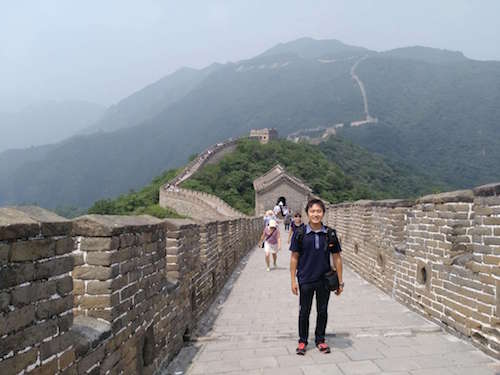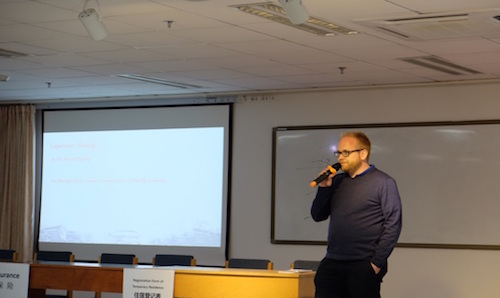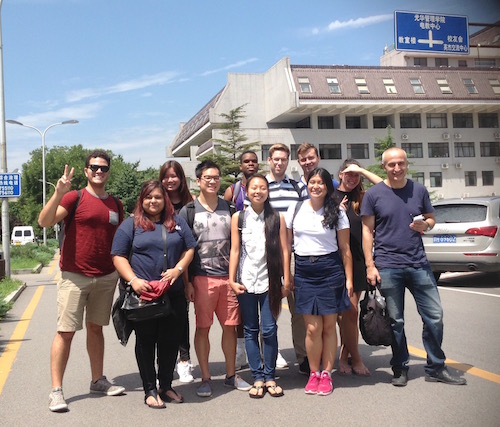Summer at Peking University is never stagnant. We have activities and summer school programs planned to enrich our incoming international students with abundant Chinese culture events and a deeper understanding of current China. One of the exciting programs in summer 2016 was Peking University’s annual Chinese Summer School Program. This year the Chinese Language Summer School Program attracted 223 students from more than 30 different nations and diverse culture backgrounds. We brought them together to Peking University, at the heart of Chinese culture to experience and learn the crown jewel of traditional Eastern history and culture.
Now the Chinese Language Summer School program along with summer has come to an end, many of our students expressed their gratitude towards Peking University for this very unique experience. And some of them even expressed their wish to relive this experience from the beginning all over again. Let’s take this sharing platform and relive the memories from oaur exciting summer through three of our students’ experiences from the program.
Baba Takeo
From Tokyo to Beijing: Understanding China is a Lifelong Goal

I met Takeo at the joint international students’ social of PKU Chinese Language Summer School and Summer School International, at first I thought he was a very friendly and charismatic international student from Japan, but the more I got to know him, the more I was impressed with his knowledge of China. Takeo approached me with a strong interest and questions about traditional small villages within the metropolitan Beijing. I was quite surprised that he had such a strong passion to get to know these villages at the heart of this ancient city, but I was more than excited and willing to visit some of the villages with Takeo. During the tour of these villages, we discussed and shared our viewpoints regarding the current events circulating China and Japan. A friendship was readily established and Takeo became my first and my best friend at this Summer School Program.
There’s an old saying in China that said, “Read ten thousand books, and walk ten thousand miles.” This phrase is an accurate depiction of Takeo’s real life. As an international relations undergraduate at Waseda University back in Japan, Takeo was open-minded and had the ambition to travel the world and expand his horizons along the way. He walked the grounds of five different continents and has visited many different countries around the world, but his favorite remained Asia. His interest in China was sparkled by his friendship with one of his Chinese friends while studying at Waseda University. Though China and Japan hasn’t had the best relations over the past, Takeo intended to overcome many of the difficulties he might encounter in his future expedition in international relations between the two neighboring nations. Like any of the Japanese students with an interest in China, he utterly understood the essential reason behind Japan and China’s uneasiness and tension with each other.
After Takeo finished his undergraduate studies, he dedicated his career to making amends and peace with China through strategic international relations and friendly reach outs. He evolved his career around building a friendly bond between the two countries. He first came to China six years ago, and right away he was deeply captivated by the culture and the atmosphere of the Chinese community. But it wasn’t until one year ago when he started learning the Chinese language. Takeo admitted that he has less free time after he started working, and his progress in learning Chinese is relatively slow, because he only had a small portion of time in learning Chinese after getting home late from work every day. Takeo fully appreciates the busy and restless lifestyle while living and working in Tokyo for more than 20 years, but this year he felt a strong pull toward China. And he chose to take a year off from work and devote his time to learning Chinese at Peking University in Beijing. Takeo has always considered himself a student even after he graduated from university. He would always include university campus visits while he was traveling the world, because he believed his time at college was one of the best experiences of his life and that college has taught him many valuable lessons that he has cherished. Though this year was Takeo eighth year after college graduate, he has never stopped learning.
Japan’s pop culture is known all around the world, and its animation is the epitome of the nation’s contemporary culture. The Japanese are extremely proud of their animated characters and Takeo was no different. However he was shocked by the popularity of Japanese animation in China. Seeing the animation’s great success Takeo came up with the idea of learning Chinese by watching the Chinese version of Japanese animation and practicing alongside.
Though this was not Takeo’s first time in China, but he was just as curious as he was the first time. He has traveled to many destinations in Mainland already and he is absolutely in love with Chinese cuisine. His favorites included the Sichuan hotpot and the Guangzhou dim sum. And through traveling Takeo has formed his own opinions about some of the cosmopolitan cities in China; Shanghai to him was an international economic hub, and Guangzhou and Chengdu was more relaxing and more suitable for living, and although Beijing’s air pollution wasn’t the most attractive feature but here encompasses thousands of years of traditional culture. And Takeo has decided to remain in Beijing for work in the future. Takeo started his Chinese language learning at the beginning of this year and he has shown significant improvement over the past eight months. Aside from attending the Chinese Summer School Program at Peking University, Takeo also has a private Chinese tutor. He has been the most diligent language learner I’ve observed during the summer programs so far.
As Takeo open a brand new chapter in his life by working in Beijing, the only thing that has changed is location, but what remains are his passion for the Chinese language and culture, and his goal of a better relationship between Japan and China.
Erling Midtgard
From Norway to Beijing: Back to Being a Student After Being a Lecturer––Pursuing His Passion for Eastern Culture

Erling Midtgard is an international student from Norway, and this summer was his second time joining Peking University’s Chinese Language Summer School. As a “senior” student, Erling was kind and generous to take the orientation stage and share some of his previous experiences with the new incoming students. He gave them helpful advice regarding the new students’ studies and their summer lives in Beijing. Erling also encouraged everyone to make friends with local Beijing residents and get to know the city better.
Erling seemed confident and composed on stage when he was addressing the new students, and that’s because he is used to facing students. We found out that Erling was a middle school teacher back home in Norway, and he taught geography and science. Outside of work, Erling has a very special hobby and that is to challenge himself to learn new languages, currently he speaks four different languages: Norwegian, English, French, and Italian. One year ago he challenged himself to learn Chinese, his intention was to challenge himself to learn a language that has pictographs as its writing system.
Language is a reflection of its representing culture, therefore China is clearly the best place to master the Chinese language. And Erling did come to China to master this relatively difficult language with pictographic writing characters. At the same time Erling was deeply interested in experiencing Chinese culture, he took short trips in between holidays during the summer and traveled to many cities with historic backgrounds and rich cultures. As a geographic master graduate student, Erling was specifically drawn to Beijing and Xi’an, because both cities are known for their historic sites and rich history that shaped modern China. While traveling through cities, Erling was determined not to miss out on any delicious Chinese cuisines either.
Erling understood the concept that “Rome wasn’t built in one day,” and the same applied in language learning. And that’s why he took private Skype lessons aside from going to classes in the morning. Being both a teacher and a student had really opened up his horizon in comparing and contrasting the differences of western and eastern education. In an eastern education environment, the teacher often emphases memorization, while in a western classroom the teacher is guiding students to reach a certain conclusion. The learning process was more important than memorizing the conclusion in western education. And after comparing the two drastically different learning concepts, Erling felt more comfortable in a western education environment.
This summer, Erling discovered that “Dialogue with Experts” lecture series is a very intriguing and rewarding experience. Especially one lecture on Chinese environment, the lecturer discussed possible future policies and their respective impacts on changing improving the environment.
Crystal Sin
From United States to Beijing: Living Life, Experiencing Differences, and Exploring Cultures

Crystal Sin is in the middle with long hair
Crystal Sin is a college freshman from Pitzer College in California, and she was both excited and nervous when she got the admission to come to China to study Chinese. She majors in Southeast Asia Studies and therefore having an understanding of the Chinese culture, history, and the language is a crucial part of her studies back in the States. However studying Chinese in the States is indirect, because you don’t get the first-hand experience of practicing Chinese with local residents and you don’t experience the culture. Unlike other international students studying in our program, Crystal decided to live with a foster family in Beijing instead of living in a dorm to get the realest experience ever. Living with an actual Beijing family lets Crystal encounter the daily routines of a regular Chinese family, and also she gets to communicate with her foster family members in Chinese.
Living with an actual Chinese family has given Crystal great insights into the modern Chinese family structure, and she has felt a significant difference between an American family and a Chinese family. Crystal was quite shocked when she realized that the grandparents of her foster family took care of the little kids in the house, but at the same time she understood the financial pressure the entire family was under and the only source of income was the parents. The Chinese society is undergoing an economic and social transitions and Crystal felt the need to come to China and experience the transition first hand.
After getting to know Crystal, I found her to be extremely lovable, outgoing and she loves to smile. She always greets everyone with a big smile on her face and it brings joy to people whenever they see her. Crystal is American Cambodian, she was born and raised in California, and therefore she was filled with curiosity when she first visited China. Crystal took every opportunity to get to know China, to get to experience the Chinese culture. She went to the Great Wall for the first time, she went to watch a Beijing opera show for the first time, and she visited the Summer Palace for the first time. She had an authentic experience of the Chinese culture at the heart of Beijing. At the end of the summer school, the program decided to take the students to Inner Mongolia to see what northern China is like, so Crystal also went to the Inner Mongolia steppe for the first time. She was so mesmerized by how beautiful the steppe looked. Crystal’s trip to China has allowed her to travel from cosmopolitan city to a plain steppe.
Besides from finding the Chinese scenery very captivating, Crystal also enjoyed all 16 lectures of “Dialogue with Experts”. She was the only student in the entire program that has attended all 16 lectures, Crystal claimed that the contents were very inspiring and were eye openers for her on some current Chinese events.
We had an overwhelmingly exciting summer with our international students. Our diverse backgrounds made this an amazing and incredible summer. Our love and interests in Chinese language and culture was the factor that brought all of us together this summer, and although the two months of summer was a relatively short period of time spending together, we have developed a special bond between every single one of the students. The leave of the last group of international students in September marked the successful ending of 2016 Peking University Chinese Language Summer School. We hope that 2017’s summer would be just as colorful and fulfilling as this summer’s.
Written by: ZHAO Jessie Zemin